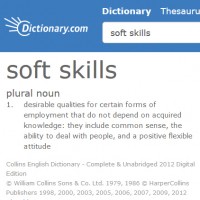While hard skills are fairly easy to evaluate, soft skills are harder.
The soft skills are rather intangible: communication, leadership, critical thinking, creativity, team collaboration, attitude, common sense, and relationships, amongst others.
Coding and problem-solving tests are fairly straightforward ways to gauge hard skill level, but how do you measure a candidate’s soft skills?
Evaluating Soft Skills
Social Media
Almost everyone in the United States has at least one social networking profile at this point, so researching a candidate’s online presence is fairly easy. Social media and websites provide an interesting window into a person’s soft skills. Of interest is everything from how thoroughly and professionally people present themselves, to the content and comments that they choose to post on online media.
Video Interviewing
Some companies solicit video responses as a filtering mechanism that quickly gives a sense of a person’s soft skills. A company may ask candidates to answer a few questions in a video format to be submitted along with a resume or as the next step in the pre-interview process. There are obviously a lot of efficiencies gained by getting a peek at talent, although some people are fairly shy of performing in front of a somewhat anonymous audience.
Referrals & Recommendations
Who referred a candidate your way can tell a lot about that person; if the referral comes from your top employee, there’s assumedly a stamp of approval that this person is capable and has the right soft skills to fit in with the team. Recommendations often speak to soft skills and can be easily accessed on LinkedIn before any interview process is begun. Formal references should be verified as a contingency to employment, but as a preview, you can get a good idea.
The Interview
In an interview setting, soft skills can be evaluated through questions such as “Can you provide example of a time when you worked on a team to accomplish a particular goal?”, or “Tell us about a challenge you faced in the workplace, and how you solved the problem”, or “Describe a time you failed in a professional role”. In listening to the answer, you will be trying to get a feeling for the person and looking for how the candidate handles tough questions, what they choose to tell you about, how they communicate the overall scenario, what problem-solving they applied, and what they learned from the situation.
Logic Problems
Presenting someone with a conundrum or logic problem is a great way to test out not only their creativity but their mettle. A well-known example is Duncker’s candle problem. And while this is a cognitive performance test that measures the candidate’s problem solving capabilities, the goal is not so much that they solve the problem but more to see how they approach it. Do they give up? What strategies do they use? Do they get uncomfortable or have fun with it?
How important are soft skills?
A predictor of fit
Candidates’ soft skills can be critical to how they fit into the company culture. Very capable people may not feel in synch with every team, which means at some point they will leave or be disruptive to the team. With estimates of the cost of a bad hire ranging from $25,000-$50,000 easily, not to mention lost opportunities and negative effects on team morale, understanding whether someone will be a good fit is critical.
A predictor of success
Candidates’ soft skills can be critical to how they succeed at their job. Given that training and advancement cost money and take time, the quicker the learner, the more valuable that employee. Soft skills are inherent traits for the most part, and a function of maturity and experience; whereas hard skills can pretty much be taught. If you have the right people with the right fit and attitude, you can pretty much teach them any of the hard skills needed within their role. Typically self-motivated, creative people who communicate and play well with others will advance your team goals much more effectively than someone with a perfect coding score and no conversation or people skills.
If you value these skills, you are not alone
Three-quarters of employers deem soft skills to be just as important as hard skills, according to a CareerBuilder Survey. And 16% of employers hold soft skills to be more important than hard skills when evaluating candidates for a job. The top ten most sought after soft skills reported in this survey are: strong work ethic, dependability, positive attitude, self-motivation, team-orientation, organization, communication, flexibility, and confidence.
About the Author:
Anna Mathieu, Marketing Communications Manager, brings together in-the-trenches recruiting experience as well as years of marketing and sales success in a variety of industries from software to real estate development. She thrives on evangelizing the Redfish brand and communicating Redfish’s expert recruiting services, to drive bottom line results.
Redfish Technology
Building Growth-Mode Tech Companies with Hand-Picked Talent
Founded in Silicon Valley in 1996, Redfish Technology is a leading provider of high tech professional and executive talent. Partnering with growth mode companies, small and large, Redfish staffs executive functions and builds out the teams below. Redfish experts provide advice and perspective on hiring, career building, and job search – check us out on the web.
www.redfishtech.com

